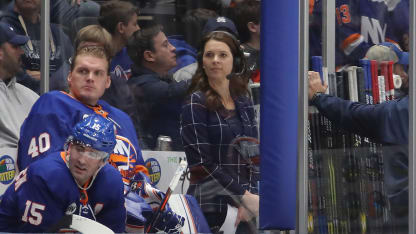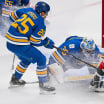NHL.com's Q&A feature called "Five Questions With …" runs every Tuesday. We talk to key figures in the game and ask them questions to gain insight into their lives, careers and the latest news.
The latest edition features New York Islanders television analyst Jennifer Botterill.
Five Questions with Jennifer Botterill
Three-time Olympic gold medalist discusses new role as Islanders television analyst, growth of women's hockey

© Bruce Bennett/Getty Images
By
Jim Cerny
NHL.com Managing Editor
Jennifer Botterill does not play competitive hockey anymore, but she still brings the same pursuit of excellence to her new role as analyst for New York Islanders broadcasts on MSG Network as she did in becoming one of the most decorated female hockey players ever.
"I spent four different Olympic cycles learning how to be an elite athlete and to perform at my peak performance and ideal performance state," Botterill said. "I've now learned to apply that to being a professional outside of competitive sports.
"It's amazing that, yes, it's a different world, but it's using that adrenaline and that preparation so that you can perform at a peak level."
The 39-year-old won three Olympic gold medals and one silver for Canada. She averaged a point per game in international play (164 points; 62 goals, 102 assists in 162 games) and added five IIHF World Women's Championship gold medals and three silvers to her trophy case.
She is Harvard's all-time leading scorer with 340 points (157 goals, 183 assists) in 113 games and had 160 points (63 goals, 97 assists) in 79 games in the Canadian Women's Hockey League.
Asked to select one standout memory, Botterill did not hesitate. It was the 2010 Vancouver Olympics, her final international game, where she assisted on Marie-Philip Poulin's gold medal-winning goal against the United States.
"Playing an Olympic gold medal game on home soil, we had high expectations for the whole Olympic experience, but it far exceeded any of our expectations," Botterill said. "That was really special, to perform well, to have so many friends and family there, and just the atmosphere was incredible."
Botterill, who lives in Toronto with her husband Adrian and two children (Maya 3, Isabelle 1), followed her good friend AJ Mleczko, a former Harvard teammate and foe on the international stage, to the Islanders broadcasts this season. Each are analysts and between-the-bench reporters for roughly 20 games apiece, though never for the same games.
Here are Five Questions with … Jennifer Botterill:
What has your first season been like behind the mic with the Islanders, and what aspect of the job do you like the most and what is the biggest challenge?
I really enjoy it. I feel like the first couple of months have been a real privilege to me and the MSG Network team has provided me all the tools I need to perform well. It's been an exciting new phase of my life. I am certainly driven to perform well, share stories and provide valuable insight.
Watching the game at ice level is a lot of fun. I feel like the skill level, the speed, just the games just fly by when I'm between the benches. So for me, it's been a lot of fun to watch the game and feel the energy at that level. Just talking about it gives me a huge smile on my face.
In terms of a challenge, I guess it's that time management. I always want to be very thorough, so it's just making sure that I can be as thorough as possible in every avenue. Like in all parts of life, there are challenges and I think I've learned to embrace them. I think it's more of an opportunity in terms of bringing your best every segment and story, making sure you can provide the best insight, best analysis that you possibly can.
Do you think that you and AJ stand out as female analysts in the NHL and that you are role models for girls?
I am hopeful that in the future it doesn't have to be a discussion, that it will be more mainstream. Is it unique right now for me and AJ to be analysts? It is, but we're hoping that this is something that becomes more common. It's just getting people that understand the game to be in those positions.
Not every girl has to play hockey, but I really think it's great that girls now have the choice to play hockey, and I would hope that it's the same case for broadcasting roles, for analyst roles, for play-by-play roles. Not every girl has to be in that role, but hopefully as we move forward, it's a choice for females to be in those roles if they are qualified and they understand the game and provide knowledgeable insight.
In a way, we are role models, and I've always had a huge level of respect for AJ in terms of her standard of excellence for everything she does. To see how she's continued to push the limits in broadcasting in various roles, she's done a great job and balanced that with being a super mom of four kids, as well. I have two young kids as well, so to see how she's pushed the limits and the boundaries and had this pursuit of excellence in every aspect of her life is something I've always respected and admired.
Are you proud of the role you've played in the growth of women's hockey?
I think it's been amazing to watch the evolution of the women's game from the first '98 Olympics that I had a chance to compete in to the growth of the game since then. I think we all take a lot of pride in that, both myself personally and I think most people that play the women's game take pride in giving back and doing whatever you can to grow the game. Whether it was when I was an athlete and making sure that I spent time after games interacting with young fans or running clinics or camps in the offseason or finding a way to grow the game. I think that's still the case today, that all of us take a lot of pride in sharing stories, communicating, maintaining interaction with young teams or players. I think that's a great way to continue to inspire and motivate the next generation.
Your mom, Doreen, was a two-time Olympian as a speed skater, your dad, Cal, played for the Canadian national team and is a noted sports psychologist, and your brother, Jason, is a former NHL player and current general manager of the Buffalo Sabres. What kind of influence did your family have on you growing up?
The great thing about my family, both my brother Jason and I feel very fortunate that my parents were always very supportive of both of us and encouraged us to be healthy and be active and participate in a lot of different sports. There was never any pressure. They would provide us with opportunities to get involved in activities in sport and we'd communicate, but it was always the decision of Jason and I on sports we played or schools that we went to or university we went to, and that's a credit to my parents for providing this unconditional support and then communicating with us and providing with these incredible life experiences. I think that provided both Jason and I with a lot of internal motivation and making our own decisions and pursuing our own goals and having high standards for ourselves.
Jason was always a huge motivation for me, too. I remember watching him play for the World Juniors team and that really sparked my motivation to play that elite hockey like my brother did. It certainly has been fun to follow Jason's path. We talked about time management. I think Jason has been amazing at that at every stage of his career. Even when he was an elite player at Michigan he always won academic awards at the same time, which was a reflection of his balance and perspective. When he retired from playing he went back and got his business degree, so he's certainly always been very driven. So for me it was an example of how to be more than a hockey player, having high standards in every aspect of your life as a person.
Now that Jason is the GM in Buffalo, do you ever call him up and say, "What are you thinking? Why did you do this or that?"
I don't know that Jason is going to give me any inside scoop now that I'm with MSG Network. I'm just kidding. He doesn't need any of my guidance. We certainly touch base quite regularly, but I'm not providing too much feedback on his professional moves. I think he's got that covered.

















